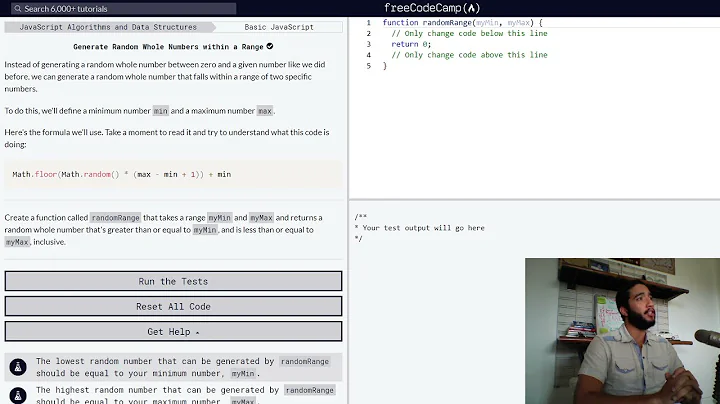Javascript: Generate a random number within a range using crypto.getRandomValues
Solution 1
The easiest way is probably by rejection sampling (see http://en.wikipedia.org/wiki/Rejection_sampling). For example, assuming that max - min is less than 256:
function getRandomInt(min, max) {
// Create byte array and fill with 1 random number
var byteArray = new Uint8Array(1);
window.crypto.getRandomValues(byteArray);
var range = max - min + 1;
var max_range = 256;
if (byteArray[0] >= Math.floor(max_range / range) * range)
return getRandomInt(min, max);
return min + (byteArray[0] % range);
}
Solution 2
IMHO, the easiest way to generate a random number in a [min..max] range with window.crypto.getRandomValues() is described here.
An ECMAScript 2015-syntax code, in case the link is TL;TR:
function getRandomIntInclusive(min, max) {
const randomBuffer = new Uint32Array(1);
window.crypto.getRandomValues(randomBuffer);
let randomNumber = randomBuffer[0] / (0xffffffff + 1);
min = Math.ceil(min);
max = Math.floor(max);
return Math.floor(randomNumber * (max - min + 1)) + min;
}
Solution 3
Many of these answers are going to produce biased results. Here's an unbiased solution.
function random(min, max) {
const range = max - min + 1
const bytes_needed = Math.ceil(Math.log2(range) / 8)
const cutoff = Math.floor((256 ** bytes_needed) / range) * range
const bytes = new Uint8Array(bytes_needed)
let value
do {
crypto.getRandomValues(bytes)
value = bytes.reduce((acc, x, n) => acc + x * 256 ** n, 0)
} while (value >= cutoff)
return min + value % range
}
Solution 4
If you are using Node.js, it is safer to use the cryptographically secure pseudorandom crypto.randomInt. Don't go write this kind of sensitive methods if you don't know what you are doing and without peer review.
crypto.randomInt([min, ]max[, callback])
Added in: v14.10.0, v12.19.0
-
min<integer>Start of random range (inclusive). Default: 0. -
max<integer>End of random range (exclusive). -
callback<Function>function(err, n) {}.
Return a random integer n such that min <= n < max. This implementation avoids modulo bias.
The range (max - min) must be less than 2^48. min and max must be safe integers.
If the callback function is not provided, the random integer is generated synchronously.
// Asynchronous
crypto.randomInt(3, (err, n) => {
if (err) throw err;
console.log(`Random number chosen from (0, 1, 2): ${n}`);
});
// Synchronous
const n = crypto.randomInt(3);
console.log(`Random number chosen from (0, 1, 2): ${n}`);
// With `min` argument
const n = crypto.randomInt(1, 7);
console.log(`The dice rolled: ${n}`);
Solution 5
Necromancing.
Well, this is easy to solve.
Consider random number in ranges without crypto-random:
// Returns a random number between min (inclusive) and max (exclusive)
function getRandomArbitrary(min, max) {
return Math.random() * (max - min) + min;
}
/**
* Returns a random integer between min (inclusive) and max (inclusive).
* The value is no lower than min (or the next integer greater than min
* if min isn't an integer) and no greater than max (or the next integer
* lower than max if max isn't an integer).
* Using Math.round() will give you a non-uniform distribution!
*/
function getRandomInt(min, max) {
min = Math.ceil(min);
max = Math.floor(max);
return Math.floor(Math.random() * (max - min + 1)) + min;
}
So all you need to do is replace Math.random with a random from crypt.
So what does Math.random do ?
According to MDN, the Math.random() function returns a floating-point, pseudo-random number in the range 0 to less than 1 (inclusive of 0, but not 1)
So we need a crypto-random number >= 0 and < 1 (not <=).
So, we need a non-negative (aka. UNSIGNED) integer from getRandomValues.
How do we do this?
Simple: Instead of getting an integer, and then doing Math.abs, we just get an UInt:
var randomBuffer = new Int8Array(4); // Int8Array = byte, 1 int = 4 byte = 32 bit
window.crypto.getRandomValues(randomBuffer);
var dataView = new DataView(array.buffer);
var uint = dataView.getUint32();
The shorthand version of which is
var randomBuffer = new Uint32Array(1);
(window.crypto || window.msCrypto).getRandomValues(randomBuffer);
var uint = randomBuffer[0];
Now all we need to do is divide uint by uint32.MaxValue (aka 0xFFFFFFFF) to get a floating-point number. And because we cannot have 1 in the result-set, we need to divide by (uint32.MaxValue+1) to ensure the result is < 1.
Dividing by (UInt32.MaxValue + 1) works because a JavaScript integer is a 64-bit floating-point number internally, so it is not limited at 32 bit.
function cryptoRand()
{
var array = new Int8Array(4);
(window.crypto || window.msCrypto).getRandomValues(array);
var dataView = new DataView(array.buffer);
var uint = dataView.getUint32();
var f = uint / (0xffffffff + 1); // 0xFFFFFFFF = uint32.MaxValue (+1 because Math.random is inclusive of 0, but not 1)
return f;
}
the shorthand of which is
function cryptoRand()
{
const randomBuffer = new Uint32Array(1);
(window.crypto || window.msCrypto).getRandomValues(randomBuffer);
return ( randomBuffer[0] / (0xffffffff + 1) );
}
Now all you need to do is replace Math.random() with cryptoRand() in the above functions.
Note that if crypto.getRandomValues uses the Windows-CryptoAPI on Windows to get the random bytes, you should not consider these values a truly cryptographically secure source of entropy.
Related videos on Youtube
user2503552
Updated on April 02, 2021Comments
-
user2503552 about 3 years
I understand you can generate a random number in JavaScript within a range using this function:
function getRandomInt (min, max) { return Math.floor(Math.random() * (max - min + 1)) + min; }Courtesy of Ionuț G. Stan here.
What I want to know is if you can generate a better random number in a range using crypto.getRandomValues() instead of Math.random(). I would like to be able to generate a number between 0 and 10 inclusive, or 0 - 1, or even 10 - 5000 inclusive.
You'll note Math.random() produces a number like: 0.8565239671015732.
The getRandomValues API might return something like:
-
231 with
Uint8Array(1) -
54328 with
Uint16Array(1) -
355282741 with
Uint32Array(1).
So how to translate that back to a decimal number so I can keep with the same range algorithm above? Or do I need a new algorithm?
Here's the code I tried but it doesn't work too well.
function getRandomInt(min, max) { // Create byte array and fill with 1 random number var byteArray = new Uint8Array(1); window.crypto.getRandomValues(byteArray); // Convert to decimal var randomNum = '0.' + byteArray[0].toString(); // Get number in range randomNum = Math.floor(randomNum * (max - min + 1)) + min; return randomNum; }At the low end (range 0 - 1) it returns more 0's than 1's. What's the best way to do it with getRandomValues()?
Many thanks
-
231 with
-
 Scott Arciszewski almost 10 yearsIn the discussion here github.com/EFForg/OpenWireless/pull/195 a more general (int > 256) solution was devised. I've taken the liberty of editing the OP with this suggested revision. :)
Scott Arciszewski almost 10 yearsIn the discussion here github.com/EFForg/OpenWireless/pull/195 a more general (int > 256) solution was devised. I've taken the liberty of editing the OP with this suggested revision. :) -
caw over 6 yearsSee
Diceware.prototype.randomin github.com/EFForg/OpenWireless/blob/master/app/js/diceware.js specifically. -
 Stefan Steiger almost 4 years0xFFFFFFFF = uint32.MaxValue (+1 because Math.random is inclusive of 0, but not 1)
Stefan Steiger almost 4 years0xFFFFFFFF = uint32.MaxValue (+1 because Math.random is inclusive of 0, but not 1)










